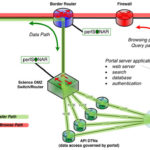Globus, a platform for research data management created by researchers at the University of Chicago and the U.S. Department of Energy’s (DOE) Argonne National Laboratory, was named the Best Integrated Software Experience Award at the 2021 Data Mover Challenge. The award took place at a recent data moving competition held at the SupercomputingAsia conference to […]
GlobusWorld to Be Held Online May 12-14
GlobusWorld, a non-profit organization that brings together researchers, systems administrators, developers and IT leaders from top research computing centers, national labs, federal agencies, and universities from around the world, will be held online May 12-14. The event is designed to provide new insights into managing research data and storage at scale, as well as building […]
Podcast: Supercomputers Battle Coronavirus
In this podcast, the Radio Free HPC team looks at how supercomputers are being used to battle the coronavirus. “We discuss how the supercomputing community has joined the fight and the impact on the battle against the virus. We do our best to keep the conversation light, knowing that everyone out there is suffering from the virus – it’s the one thing we all have in common these days.”
Steve Tuecke from Globus passes away
It is with tremendous sadness that we share the news of the death of our dear friend and colleague Steve Tuecke on November 2, 2019. “Steve was also a consummate architect of organizations. Argonne’s Distributed Systems Lab, the international Globus Alliance, the Computation Institute at the University of Chicago, the Globus team – each of these organizations was shaped by Steve’s vision, his often iconoclastic approach, and his talent for recruiting exceptional people.”
Globus Integrates with Box Cloud Content Management
Today the Globus research data management service announced the general availability of Globus for Box, a new solution for seamlessly connecting Box with an organization’s existing research storage ecosystem. “The Box connector is a valuable addition to our Globus subscription, since it will let our users easily plug Box into their existing ecosystem of research data storage systems,” said Doug Johnson, chief systems architect and HPC systems group manager, Ohio Supercomputer Center.
Argonne Team Breaks Record with 2.9 Petabytes Globus Data Transfer
Today the Globus research data management service announced the largest single file transfer in its history: a team led by Argonne National Laboratory scientists moved 2.9 petabytes of data as part of a research project involving three of the largest cosmological simulations to date. “With exascale imminent, AI on the rise, HPC systems proliferating, and research teams more distributed than ever, fast, secure, reliable data movement and management are now more important than ever,” said Ian Foster.
Video: Managing large-scale cosmology simulations with Parsl and Singularity
Rick Wagner from Globus gave this talk at the Singularity User Group “We package the imSim software inside a Singularity container so that it can be developed independently, packaged to include all dependencies, trivially scaled across thousands of computing nodes, and seamlessly moved between computing systems. To date, the simulation workflow has consumed more than 30M core hours using 4K nodes (256K cores) on Argonne’s Theta supercomputer and 2K nodes (128K cores) on NERSC’s Cori supercomputer.”
Agenda Posted for GlobusWorld 2018 in Chicago
The good folks at GlobusWorld 2018 have posted their speaker agenda. The meeting takes place April 25-26 in Chicago. “Our theme for 2018 is Connecting your Research Universe. When it’s easy for researchers to move and share data across any location (e.g. campus clusters, XSEDE systems, lab servers, scientific instruments, archival storage, commercial clouds), they can collaborate more successfully and get to results faster. Globus now makes this possible, with connectivity to virtually any storage location via a single, easy to use interface. It has never been simpler to connect the universe of research data to the researchers who need it.”
Engineering a Better Portal for Scientific Discovery
Engineers from ESnet and the Globus team have designed a new approach that makes data sharing faster, more reliable, and more secure. As described in a new report, the “Science DMZ” provides a new architecture to meet increasing demands for accessing shared data.
Globus for Google Drive Provides Unified Interface for Collaborative Research
Today Globus.org announced general availability of Globus for Google Drive, a new capability that lets users seamlessly connect Google Drive with their existing storage ecosystem, enabling a single interface for data transfer, sharing and publication across all storage systems. “Our researchers wanted to use Google Drive for data storage, but found that they had to babysit the data transfers,” said Krishna Muriki, Computer Systems Engineer, HPC Services, at Lawrence Berkeley National Laboratory. “They were already familiar with using Globus so we thought it would make a good interface for Google Drive; that’s why we partnered with Globus to develop this connector. Now our researchers have a familiar, web-based interface across all their storage resources, including Google Drive, so it is painless to move data where they need it and share results with collaborators. Globus manages all the data movement and authorization, improving security and reliability as well.”










